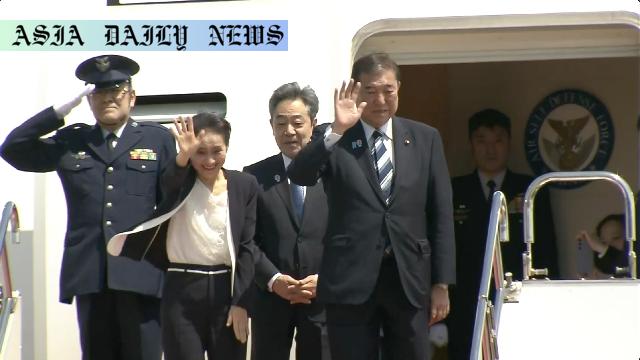Security Cooperation: Japanese Prime Minister Ishiba discusses bilateral relations and regional issues with Vietnam and Philippines.
Key Point 1: Japanese Prime Minister Ishiba begins a 4-day visit to Vietnam and the Philippines to strengthen ties.
Key Point 2: Talks will include regional security concerns involving China and economic impacts of US tariffs.
Key Point 3: Meetings are scheduled with top leaders, including Vietnam’s To Lam and Prime Minister Chinh, as well as Philippine President Marcos Jr.
Key Point 4: Ishiba seeks to enhance security collaborations and ensure Japanese companies’ concerns are addressed.

Background of Ishiba’s Visit
Japanese Prime Minister Ishiba Shigeru embarked on a high-stakes diplomatic mission to Vietnam and the Philippines, aiming to deepen bilateral ties and collaborate on key issues such as security and economics. His four-day visit, commencing from Tokyo’s Haneda Airport on Sunday, underscores the growing regional importance of Southeast Asia in countering strategic challenges and fostering economic resilience.
Arriving in Vietnam first, Ishiba is scheduled to hold meetings with Communist Party General Secretary To Lam and Prime Minister Pham Minh Chinh. These meetings aim to address strategic concerns, particularly the regional stability threatened by China’s assertive maneuvers in the South China and East China Seas. The discussions are likely to cover ways to bolster mutual security cooperation and establish frameworks to maintain peace and sovereignty in the region.
Addressing Regional Security Challenges
As geopolitical tensions intensify in Asia, the South China Sea remains a contentious point of discussion. Ishiba voiced his concerns over China’s aggressive posture and unilateral attempts to change the status quo by force, impacting not just Japan but the broader region. Enhancing security alliances with Vietnam and the Philippines is pivotal in ensuring collective resistance against such actions. Both nations, close to strategic maritime routes, hold significant geopolitical influence, making their cooperation vital for maintaining peace in the Indo-Pacific region.
The meetings are expected to emphasize maritime security, joint military exercises, and information-sharing mechanisms to counterbalance China’s assertive policies. Additionally, by fostering stronger relationships with key ASEAN members like Vietnam and the Philippines, Japan aims to enhance regional security stability and establish itself as a key ally in Southeast Asia.
Economic Impact and the Role of Tariffs
Apart from security cooperation, economic discussions will play a central role during Ishiba’s visit. The Japanese prime minister highlighted the potential consequences of the United States’ recent tariff measures, which could significantly affect the economies of both Vietnam and the Philippines, as well as Japanese enterprises operating in these countries. Collaborative strategies to mitigate such impacts will be on the agenda.
Japan, historically a significant investor in Southeast Asia, seeks to maintain and expand its economic footprint through these diplomatic engagements. Ishiba expressed his intent to align Japan’s policies with the economic realities faced by Vietnam and the Philippines, ensuring support for domestic and international businesses facing challenges. Concurrently, these discussions present Japan with an opportunity to reinforce its economic partnership agreements in the region.
Future Prospects and Regional Unity
The significance of this visit lies not only in addressing immediate concerns but also in shaping long-term strategies for regional security and economic unity. Ishiba’s diplomatic outreach symbolizes Japan’s proactive approach to fostering partnerships amidst shifting global power dynamics. Stronger ties with Vietnam and the Philippines could set a precedent for other nations in the region, promoting collaboration in tackling shared challenges.
This visit is a testament to the growing interdependence between Japan and Southeast Asia, highlighting shared interests in both stability and prosperity. By strengthening alliances and addressing mutual concerns, Ishiba aims to solidify Japan’s role as a strategic partner in achieving regional peace and development.



Commentary
The Strategic Importance of Ishiba’s Visit
Prime Minister Ishiba’s visit to Vietnam and the Philippines is more than just a diplomatic gesture; it represents a calculated move to strengthen Japan’s alliances in a rapidly changing geopolitical landscape. As China’s influence continues to grow, Japan’s role in cultivating regional unity and fortifying security measures becomes increasingly vital.
Security cooperation, particularly in the maritime domain, is the cornerstone of these discussions. Vietnam and the Philippines remain crucial players in the South China Sea conflict, given their proximity to major maritime routes and frequent encounters with Chinese assertiveness. By bolstering ties with these countries, Japan not only seeks to protect mutual interests but also positions itself as a responsible regional power advocating for stability and the rule of law.
A Balanced Approach to Economics and Security
Economic concerns also feature prominently in Ishiba’s agenda, demonstrating Japan’s comprehensive approach to diplomacy. The impact of new U.S.-imposed tariffs cannot be understated, especially as Vietnam and the Philippines grapple with potential disruptions to their economies. This affects not only local businesses but also Japanese enterprises with deep investments in these nations.
In navigating these challenges, Ishiba has shown remarkable strategic foresight. By listening to the concerns of Japanese companies and engaging with local leaders, he is paving the way for tailored policies that address specific economic needs. Such initiatives fortify Japan’s role as a valuable and understanding partner in the region.
Broader Implications for Regional Unity
Ishiba’s diplomatic efforts extend beyond immediate concerns, aiming to foster long-term regional unity. His outreach reflects Japan’s commitment to creating a cohesive coalition of nations that can collectively address global challenges. Strengthening relationships with Vietnam and the Philippines could set a benchmark for deeper collaboration across ASEAN and beyond.
Ultimately, the success of this visit will be measured by the tangible outcomes achieved in security cooperation, economic resilience, and mutual understanding. Ishiba’s proactive diplomacy is a step toward realizing a more stable and prosperous Asia where nations can navigate challenges together.